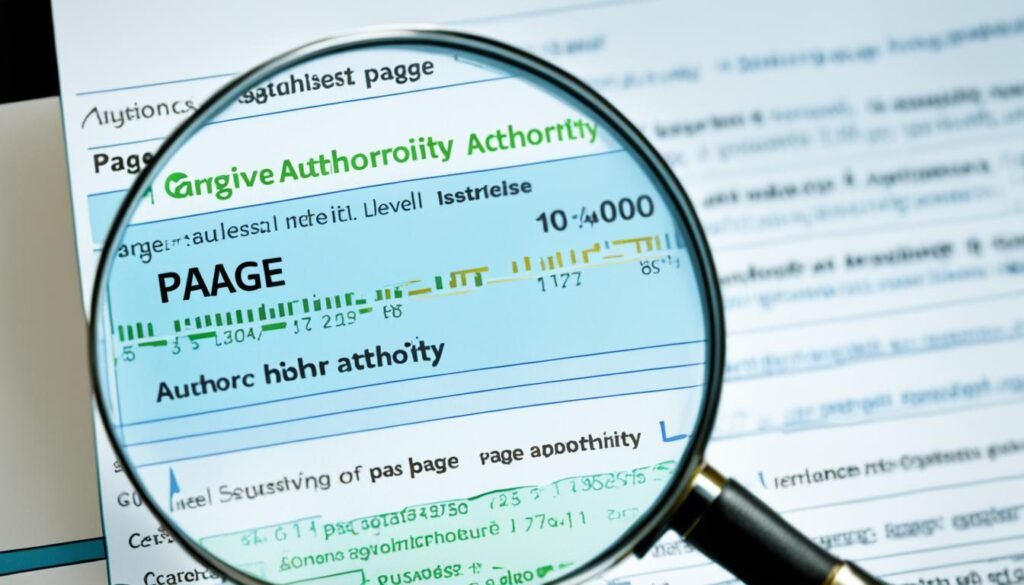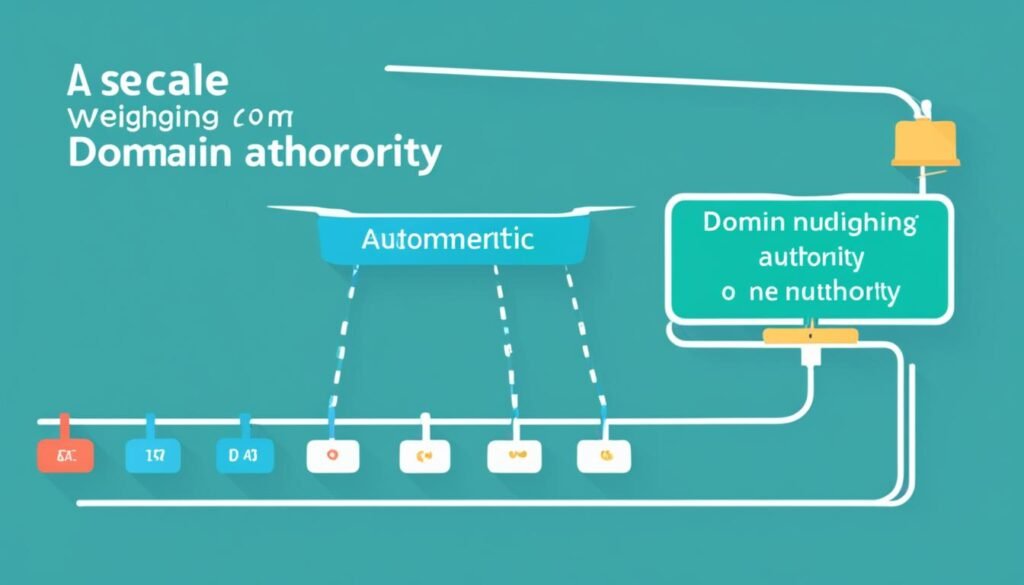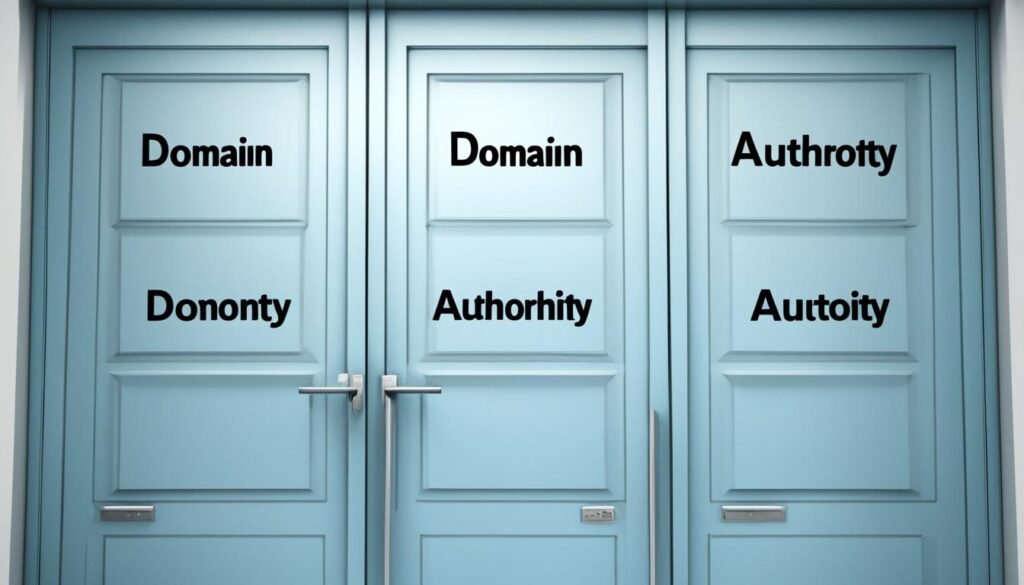Engaging in a thorough evaluation and optimization exercise concerning the domain authority (DA) and page authority (PA) metrics associated with your website could significantly pivot your SEO undertakings. Initiated by Moz, Domain Authority stands as a pivotal search engine ranking pointer. It prognosticates the feasibility of a given website securing a placement within the distinguished search engine results pages (SERPs). The evaluation scale of this metric encompasses values from 1 to 100, where an ascension in this numerical value correlates directly with an amplified probability of superior ranking. Conversely, Page Authority is defined as the appraisal of the vigor of your website’s specific pages. By maintaining a vigilant eye on and refining both the DA and PA, an avenue is paved towards an enhancement of the comprehensive SEO efficacy, thereby augmenting the influx of organic visitors to your digital domain.
Key Takeaways
- Domain Authority is a Moz metric that predicts a website’s ranking ability in search engines.
- Page Authority focuses on the ranking strength of individual web pages.
- Monitoring and improving your DA and PA can enhance your overall SEO and organic traffic.
- Utilize free tools to check your website’s domain da and pa scores.
- Implement strategies to build domain authority and page authority for better search visibility.
What is Domain Authority?
Domain Authority (DA), a nuanced SEO benchmark devised by Moz, offers insight into a website’s probable positioning on search engine result pages (SERPs). Comprehending this metric involves acknowledging a scale where entities receive a ranking between 1 and 100. Scores approaching the highest echelons signify an increased likelihood of superior placement within search results.
Domain Authority Explained
The essence of Domain Authority lies in its holistic evaluation of numerous domain-specific attributes. Critical components such as the domain’s age, the caliber and volume of links pointing towards it, alongside the comprehensive scope and organization of the website are meticulously examined. This amalgamation yields a nuanced understanding of the entity’s general prowess, determining its competitive stance in search ranking algorithms.
How Domain Authority is Calculated
Calculating Domain Authority with Moz embarks on a sophisticated algorithmic journey, orchestrating the appraisal of more than 40 distinct performance indicators. Despite the proprietary nature of its specifics, the methodology is believed to weigh metrics like the domain’s communal link volume, the influencer status of its affiliational domains, and the overall fabric of its digital connectivity. The conflation of these underpinning variables instigates the genesis of a DA value, offering profound insights into the virtual clout of a digital entity.
Tracking Your Site’s Domain Authority
Gauging your website’s Domain Authority is facilitated through the provision of considerate tools such as Moz’s Link Explorer or the MozBar—a browser extension. With these instruments at your disposal, an assessment of your website’s standing, in contrast to competitors, unveils itself. This strategic acumen aids in the plotting of optimization measures, thus enhancing your digital footprint’s competitive edge.
Why is Domain Authority Important?
Domain Authority (DA) stands as an indispensable yardstick within the SEO domain by virtue of its potent correlation with superior rankings within Search Engine Results Pages (SERPs). Studies have unequivocally demonstrated a robust, positive tie between a domain’s DA score and its performance in organic rankings. Thus, proliferating DA not only portends better organic visibleness but also confers a competitive edge over entities exhibiting inferior DA metrics.
Correlation with Search Engine Rankings
The salience of domain authority is underscored by its compelling link with commendable rankings on preeminent search engines, including Google. Eminent within the realm of SEO, it has been ascertained through in-depth analyses that DA significantly influences where a website positions itself in search outcomes. Ergo, the pursuit of enhancing Domain Authority is tantamount to bolstering your site’s discoverability and attracting a greater influx of visitors through organic searches.
Benchmarking Against Competitors
Yet another critical facet that accentuates the importance of domain authority lies in its role as a compass for appraising your virtual visage against industry counterparts and adversaries. Establishing a firm grasp on your benchmarking domain authority facilitates the discernment of your site’s comparative strengths and weaknesses, thereby enabling a strategic roadmap to surpassing competitors where deficits emerge. Utilizing DA evaluations to discern areas warranting enhancement, you are empowered to craft laser-focused plans aimed at parity with or the outshining of competing domains.
What is a Good Domain Authority Score?
In assessing your website’s domain authority (DA) score, an unequivocal definition of a “good” or “average” score remains elusive. Domain authority serves as a pivotal, yet relative, metric, contingent upon the competitive essence surging within your industry, alongside the DA scores demonstrated by your immediate rivals.
Understanding Domain Authority Ranges
Domain authority spans a numeric continuum between 1 and 100, where augmented digits bespeak superior prospects for securing elevated placements within search engine results pages (SERPs). A typical range for websites encapsulates DA metrics from 20 to 60, extolling those beneath 20 as meager and identifying counterparts exceeding 60 as broadly authoritative.
Relative vs. Absolute Scores
The conceptualization of domain authority optionally diverges from an absolute, deterministic construct; it envisages a relative gauge of your website’s competency juxtaposed against those of competitors. Ergo, the strength of a DA rating, elucidated by a numeric designation, varies across industries, relegating a score of 40 to the precinct of visible authority in confrontational juxtaposition, yet marginality in others.
To effectively discern your domain authority score’s significance, a benchmarking initiative becomes imperative, offering insight into your positioning vis-à-vis the top echelon within your industry. Such a conducted analysis unveils critical areas, empowering a strategic orchestration of SEO investments, thereby engineering an advancement amongst good domain authority scores.
Increasing Your Domain Authority
Fostering your website’s Domain Authority (DA) constitutes a pivotal objective for heightening its visibility within search engines and enhancing your SEO performance. The framework for this endeavor resides in deploying established backlink building strategies, refining your on-page SEO factors, and employing efficient content marketing tactics. Such endeavors serve to increment your domain’s authority incrementally, inviting a more substantial influx of organic traffic to your online domain.
Quality Backlink Building Strategies
The preeminent tactic for advancing Domain Authority lies in the procurement of superior, relevant backlinks. This involves engagements such as guest posting on preeminent blogs within your industry, engaging in influencer outreach to garner endorsements and connections, and executing broken link building operations to update stale links. Moreover, the development of linkable assets, comprising comprehensive industry analyses, instructional materials, or scholarly investigations, is instrumental in drawing commendable backlinks from trustworthy sources.
On-Page SEO Optimization
Complementing your link-building initiatives, the meticulous optimization of your on-page SEO is paramount. This entails aligning your website’s content, structure, and technical facets with industry best standards. Critical on-page areas to attend to encompass the refinement of your page titles, meta descriptions, header tags, internal linkage, image configurations, and site rapidity. By consistently honing these on-page facets, you enhance your pages’ relevance and authority, Kilimanjaro hiking tipping the scales in your favor for bolstering Domain Authority.
Content Marketing Tactics
Strategic deployment of content marketing remains an influential stratagem for augmenting your website’s Domain Authority. The production of superlative, insightful content custom-tailored to resonate with your intended audience initiates a domino effect, engendering natural backlinks, social distribution, and user interaction. This spectrum of activities encompasses the publication of exhaustive blog entries, the establishment of visually captivating infographics, or the orchestration of topical webinars and podcasts. Consecrated provision of value through your content underpins the establishment of credibility and authority requisite for DA enhancement.
Domain DA And PA Check
Understanding your website’s domain authority (DA) and page authority (PA) metrics is paramount for gauging your site’s search engine optimization (SEO) efficacy. Luckily, a plethora of tools exist for quick and insightful assessment of these pivotal ranking components.
Free Domain Authority Checker Tools
Moz’s Link Explorer stands out among the esteemed free domain authority checker tools. By inputting your website’s URL, you can promptly discern your DA score and juxtapose it with that of your competitors. For seamless and immediate access to your site’s domain authority and other essential SEO metrics, the MozBar browser extension offers unparalleled convenience.
Interpreting Domain Authority Scores
Deciphering the implications of your domain authority assessment is integral. Scores, ranging from 1 to 100, bespeak a site’s capacity to feature prominently in search engine results pages. Typically, a DA score surpassing 40 signifies notable strength, whereas a value beneath 20 hints at the necessity for intensified SEO endeavors to enrich your digital footprint.
Comparative analysis with industry counterparts enables a strategic vantage point. Assessing your domain authority vis-à-vis competitors within your niche fosters the identification of actionable enhancement avenues. This approach facilitates the formulation of a tailored SEO strategy aimed at elevating your search engine rankings.
What is Page Authority?
Domain Authority serves as a broad index for a website’s overall authority, whereas the concept of Page Authority (PA) pertains solely to the individual page’s ranking potency. Employing a sophisticated algorithm, Moz formulates PA by considering numerous aspects, notably the web page’s incoming links.
Page Authority vs. Domain Authority
Setting itself apart from the encompassing Domain Authority, which roughly gauges an entire site’s SEO prowess, Page Authority meticulously scrutinizes the ranking precedence of singular URLs. This analytical delineation is pivotal, given that disparate pages within a site can exhibit varying PA metrics in stark contrast to the overarching Domain Authority.
Calculating Page Authority
Moz’s algorithm gauges a page’s Page Authority via an intricate evaluation of signals, including both the quantitative and qualitative aspects of incoming links directed at the page under analysis, in conjunction with the page’s on-page optimization schemes. The PA, ranging from 1 to 100, essentially forecasts the page’s competence regarding favorable search engine rankings.
| Metric | Description | Calculation |
|---|---|---|
| Domain Authority (DA) | Measures the overall authority and ranking potential of a website. | Considers factors like backlink profile, domain age, and other site-wide signals. |
| Page Authority (PA) | Assesses the ranking strength of a specific web page. | Evaluates on-page optimization and inbound links pointing to that individual URL. |
Importance of Page Authority
Page Authority (PA) remains pivotal within the realm of SEO, governing individual web page performance in search engine results. Its influence directly correlates with a page’s positioning on renowned SERP platforms such as Google and Bing. By attaining a higher PA, web pages enhance their chances of securing premier visibility, thereby amplifying the influx of organic traffic to the associated website.
Ranking Individual Pages
Distinct from the comprehensive evaluation provided by Domain Authority (DA), Page Authority delves into the individual merit and accessibility of each web page. A page bolstered by a superior PA is poised to surpass its counterparts in search engine rankings; a beneficial feat in seizing dominance over specific search queries. This advantage translates into a dominant slice of the search traffic relevant to the topic, significantly furthering a website’s competitive edge.
Internal Link Structure Optimization
Optimization of the internal link architecture within a website serves a fundamental purpose. It ensures equitable distribution of Page Authority, thus elevating the ranking prospects of paramount content. This strategic maneuver involves the placement of authoritative links, originating from pages with elevated PAs, towards those of lesser authority. Consequently, such actions fortify the holistic authority of a website, accentuating the pivotal role that importance of page authority holds in its overall SEO efficacy.
Essential to this endeavor is the perpetual assessment of a website’s Page Authority metrics, alongside the consistent refinement of its internal link structure. This meticulous approach is foundational for cultivating enduring organic growth and fortifying page authority for rankings. When harmonized with established internal linking methodologies, a strategy founded on PA yields exponential gains in search prominence and the consequent generation of leads.
Checking Page Authority
Understanding your web page’s Page Authority (PA) is pivotal for discerning its positional strength and trajectory within search rankings. An array of dependable tools exist to measure and track these very scores.
Using Page Authority Checker Tools
For a comprehensive evaluation of your website’s Page Authority, utilizing Moz’s Link Explorer emerges as a forefront strategy. This potent application empowers users to input any URL for an immediate assessment of its PA score. Furthermore, it furnishes crucial SEO benchmarks like Domain Authority (DA), the tally of backlinks, and linking root domains.
Supplementing this approach, the MozBar — a browser extension by Moz — facilitates a swift appraisal of any page’s Page Authority by the mere click of the Moz icon in your browser’s interface.
Analyzing Page Authority Trends
Beyond isolated PA evaluations, the scrutiny of page-level PA variance across time is enlightening. Such retrospection avails insights into the efficacy of SEO undertakings, proffering cues for strategic enhancements.
Both Moz’s Link Explorer and the MozBar provision historical PA insights, detailing a page’s authority evolution. This chronicle enables a granular examination of the determinants influencing a page’s SEO robustness, thereby guiding content and link building strategy recalibration.

Improving Page Authority
To enhance the Page Authority (PA) of web pages, implementing several vital strategies is essential. Focusing primarily on optimizing on-page SEO factors is imperative. This encompasses refining your content, structure, and technical configuration to boost the page’s potential for higher rankings.
Key components such as including keyword-rich titles and meta descriptions, crafting clean URL structures, ensuring rapid page loading times, and embracing mobile-responsive design are critical. A well-optimized page communicates to search engines the value and relevance of your content.
Optimizing On-Page SEO Factors
Furthermore, augmenting the PA relies heavily on garnering high-quality backlinks. It is paramount to earn links from domains recognized for their authority and relevance within your industry. This achievement is made possible through strategic guest posting, broken link repairs, and proactive digital PR initiatives.
Increased references from renowned sites significantly fortify a page’s overall authority, leading to improved organic search positioning and a greater influx of qualified visitors to your domain.
Building High-Quality Backlinks
Emphasizing both on-page optimization and the cultivation of strategic link assets enables a gradual increase in page authority. This comprehensive strategy not only broadens your search visibility but also establishes your brand as an influential entity in its sector.
Domain Authority vs. Other Metrics
In the digital realm, the evaluation of a website’s authority and its potential for ranking is a multifaceted endeavor. While Domain Authority (DA) enjoys primacy in many discussions, it exists alongside counterparts such as Google’s PageRank and Ahrefs’ Domain Rating. Each of these metrics sheds light on diverse aspects of a site’s online sway and efficacy. By examining these in concert, a holistic view of a website’s positioning within the digital landscape emerges.
PageRank and Domain Rating
PageRank, a foundational component of Google’s algorithm arsenal, appraised webpages based on their perceived significance and influence. Although the dissolution of public PageRank scores obfuscated its direct utility, the essence of scrutinizing a site’s linkage schema and global effect remains salient. Concurrently, Ahrefs’ Domain Rating, distinguished by its quest to forecast a domain’s search engine performance, parallels the objectives of Moz’s Domain Authority.
Comparing Metric Reliability
Exploring the juxtaposition between Domain Authority and its counterparts like PageRank and Domain Rating reveals an intricate tapestry of insights. Domain Authority, crafted by the esteemed SEO entity Moz, has established itself as a cornerstone in website evaluation. In contrast, the divergence in PageRank’s operational clarity over time and Domain Rating’s emergence as a contender spotlight the evolving nature of digital ranking criteria. A judicious synthesis of these metrics is advised for a nuanced evaluation of an entity’s digital footprint.

Best Practices for Authority Building
To bolster your website’s domain and page authority significantly over time, it is crucial to adhere to white hat SEO techniques. These strategies harmonize with search engine stipulations. Such an approach necessitates the deployment of tactics such as:
White Hat SEO Techniques
- Producing high-caliber, educative content designed to enrich your intended readers
- Cultivating a comprehensive link building agenda that focuses on acquiring pertinent, credible backlinks
- Fining your website’s on-page SEO facets, which encompasses refining title tags, meta descriptions, and image alt descriptions
- Partaking in content marketing strategies such as contributing as a guest writer, forging connections with key influencers, and engaging in digital public relations
Avoiding Black Hat Tactics
Facilitating your website’s growth through black hat SEO tactics might seem beneficial in the short run, but their adverse effects on long-term authority and search rankings make them untenable strategies. On the roster of to-be-avoided activities lie link farming, the excessive use of keywords to manipulate search results, and the misdirection of users through cloaking.
Long-Term SEO Strategy
Developing substantive domain authority and page authority demands perseverance. It mandates a commitment to durable, long-term SEO schemes that gradually enhance your site’s standing and trustworthiness in the digital sphere. Such investments pave the way for sustained triumph over the foreseeable future.
Authority Metrics and SEO Success
Domain Authority and Page Authority serve as pivotal barometers for authority metrics seo success. They demonstrate a profound link with a website’s capacity to engender da pa organic traffic. Instances abound wherein elevated DA and PA credentials elevate a site’s standing not only within Google but across popular search engines. Consequently, the influx of visitors via unpaid conduits proliferates.
Correlation with Organic Traffic
Research consistently underlines the positive correlation between a site’s Domain Authority and Page Authority and the consequential generation of da pa organic traffic. Robust authority metrics confer a notable advantage, attributing to a sustainable amplification in organic search penetration and its attendant levels of traction.
Monitoring and Optimization
Assiduous cultivation of authority metrics seo success mandates regular monitor and optimize regimen for DA and PA escalation. This approach facilitates the pinpointing of optimization prospects, tracks the efficacy of SEO initiatives, and fosters informed, data-centric stratagems to bolster the global stance and visibility of your digital presence.
| Metric | Description | Correlation with Organic Traffic |
|---|---|---|
| Domain Authority (DA) | A Moz-conceived metric indicative of a website’s likelihood to secure prominent search engine positioning. | An undeniable, advantageous relationship is noted. Augmented DA values correspond with heightened da pa organic traffic elicitation. |
| Page Authority (PA) | An individual page’s caliber and potential to secure superior rankings is denoted by this metric. | Paired with a notable, albeit nuanced, correlation, increased PA fortifies the prerogative of a page to rank favorably and bolster da pa organic traffic. |
Resources for Authority Analysis
In the pursuit of enhancing and overseeing your website’s domain and page authority, an array of esteemed SEO instruments and frameworks is available for detailed examination and insights. These resources are indispensable for the continual measurement of advancement, the establishment of competitive benchmarks, and the recognition of areas primed for enhancement.
Respected SEO Tools and Platforms
Preeminent solutions for authority evaluation encompass Moz’s Link Explorer, Ahrefs’ Site Explorer, and the Domain Analytics feature within SEMrush. These pioneering suites within the SEO landscape furnish an exhaustive review of your website’s DA and PA appraisals. Additionally, they divulge meticulous analyses of backlink architectures, competitor discourse, and beyond.
Authority Tracking and Reporting
Diligence transcends mere observation of contemporary authority metrics; it necessitates understanding the fluidity and trajectory of these values. SEO frameworks often incorporate mechanisms for historical data juxtaposition and custom reporting. This aids in the visualization of domain and page authority trends, empowering the clear identification of effective strategies and the formulation of enlightened SEO strategies.
By fully utilizing authority analysis resources, SEO tools, and authority tracking functionalities, a marked advantage is gained. Achieving an elevation in organic visibility and the subsequent improvement in search engine standings becomes attainable.


